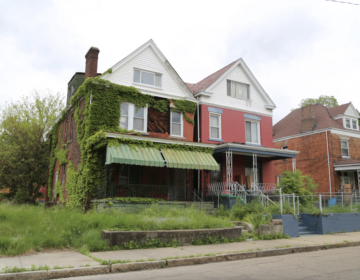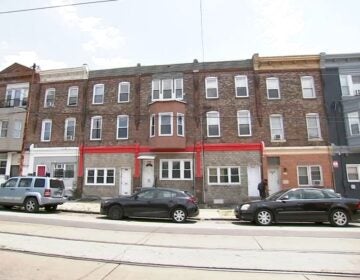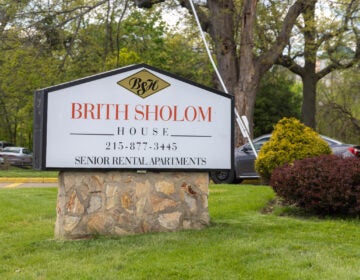Philly’s heralded eviction diversion program is considered a win-win — for most
The program is guided by one goal: To settle disagreements between landlords and tenants outside of court and without an eviction filing.
Listen 5:52
A view looking down Front Street towards the Benjamin Franklin Bridge in Philadelphia, Thursday, Aug. 10, 2017. (AP Photo/Matt Rourke)
Bruce Ticker knew some of his neighbors in his Northeast Philadelphia apartment complex had gotten notices from the new owners about rents going up.
He was still shocked when he got his in early May. The rent for his one-bedroom place was going to be twice as high.
“They essentially said in polite language: Pay the $1,185 or we’re going to kick you out,” said Ticker.
He began to panic. As a 72-year-old retiree, living on a fixed income, there was no way he could afford the price hike. Not without draining his savings account. And even that wouldn’t get him far.
He started working the phones, hoping to find someone who could quiet his fears of becoming homeless.
“And in June, I finally got somebody from the SeniorLAW Center,” Ticker said.
An attorney with the legal aid group got the owners to the negotiation table thanks to Philadelphia’s mandatory Eviction Diversion Program. Under an agreement brokered over email, Ticker was able to remain in the apartment he’s called home for nearly a decade — at the same price he’s paid for years.
Ticker credits the free initiative with keeping a roof over his head, at least for now. His lease runs out at the end of April.
“I’m hopeful we can work something out at the very least,” he said. “But of course, my attorney may have other ideas, better ideas.”
Established by city ordinance, the pandemic-inspired program is guided by one goal: To settle disagreements between landlords and tenants outside of court and without an eviction filing, which can make it harder for tenants to secure safe and affordable housing in the future, even if a judge rules in their favor.
At first, the acclaimed program dealt exclusively with disputes over back rent. Many of those cases were resolved with the help of state and federal dollars dispersed through a rental assistance program the city operated. The latest iteration of the diversion program requires landlords and tenants to spend 30 days trying to settle any rental disagreement, including ones involving property damage.
Ticker is one of at least 7,000 tenants who have been able to stay in their homes thanks to direct negotiations between parties, one of two pathways supported by the program.
Another 3,000 landlord-tenant pairs participated in mediation sessions facilitated by a neutral party. Nearly 80% of those disputes were resolved with an agreement outside of court, according to the city.
Some after a landlord agreed to extend a deadline or be paid in a series of installments. Others after a tenant agreed to move out — what the program refers to as a “graceful exit.”
Nancy Giacomini, the mediation manager for the Eviction Diversion Program, said most of the agreements reached through mediation come after a single one-hour session, usually because neither party really wants to go to court, which can be a time-consuming and expensive process.
“Part of the reason I think the diversion program works is because we’ve given tenants, and landlords, and property managers, and agents an option that’s not the most escalated process to resolve something,” Giacomini said.
More often than not, the conversations are civil, containing more empathy than rancor, she said.
“I’ve had many tenants say back to a landlord that they know, ‘I’m really sorry. I desperately want to make this work and pay you. I really don’t want to leave and I don’t know how to make it happen.’ And on the other side, I’ve had landlords cry in that space because they just hate to be in this predicament that they don’t know how to get out of.”
“It’s a business relationship that can also be quite personal,” she added.
Shayln Martin’s praise for the program has more to do with the first part of that sentiment. She handles eviction cases for landlords. Most arise after a tenant has stopped paying rent and her client wants to remove them.
In the past, Martin’s work usually ended with an appearance at landlord-tenant court, a tedious and often drawn-out process that can take up to six months to complete. Now she’s attending mediation sessions on her clients’ behalf.
So far, none of those cases have ended up before a judge. And Martin said all of them have wrapped up in roughly two months.
“Yes, it does put another 30 days onto the process if you look at it that way. But if you use it to your advantage, then it definitely works,” Martin said.
The program does have its critics.
Greg Wertman leads HAPCO Philadelphia, the city’s largest advocacy group for landlords and property managers. His big complaint is that the diversion program lacks teeth, particularly when it comes to financial agreements to repay back rent.
In landlord-tenant court, there’s a judge to enforce the agreement. The diversion program doesn’t have a similar enforcement mechanism.
“Okay, so here we are, we negotiated this thing, we lost 30 to 45 days, we come up with an agreement. Tenant reneges on the agreement. You’re back to square one,” Wertman said.
Eretz, a small landlord in Philadelphia, shared a similar complaint. WHYY News has agreed to withhold his last name due to privacy concerns.
Eretz said program staffers were perfectly pleasant, but couldn’t offer him much help. His longtime tenant no longer owed any back rent by the time the two participated in their first mediation session, but she also doesn’t have a reliable source of income to cover rent going forward. This after her father, who lived with her and her family, recently died.
She was getting paid to care for him at home. Her father also had a city pension that went toward the rent at the four-bedroom home he shared with his daughter’s family in Northeast Philadelphia.
Eretz said he feels for his tenant, who is dealing with “major” health issues of her own, as well as a son who is facing murder charges. But he said he can’t allow her to stay for another year if she can’t cover the rent each month, especially now that his property taxes are higher.
“My agenda is not to kick somebody out. It’s to get paid and to maintain a positive relationship,” said Eretz, who helped her and other tenants apply for rental assistance during the pandemic.
The pair is scheduled to participate in a second mediation session next week. Eretz still hopes to avoid landlord-tenant court, but it’s not clear that will happen.
It’s part of the reason why HAPCO’s Wertman said the latest version of the program should not be mandatory — because mediation doesn’t work in every case.
“In other words, you have a tenant, he’s driving all the tenants, your good tenants crazy, and you want to get rid of them. Their lease is up. Time to get rid of them. What am I going to diversion for? What am I wasting 30 to 45 more days of this person hassling my good tenants?”
Changes could be coming to the program, including the possibility that the current version of the program becomes voluntary. But for now, it remains in place as a free, but mandatory process.
In October, Philadelphia City Council passed legislation that extends the program through June 2024.
Council and Mayor Jim Kenney’s administration have allocated a total of $45 million for the continuation of the diversion program, including $30 million for direct assistance during the fiscal year that ends June 30, 2023.
 WHYY is one of over 20 news organizations producing Broke in Philly, a collaborative reporting project on solutions to poverty and the city’s push towards economic justice. Follow us at @BrokeInPhilly.
WHYY is one of over 20 news organizations producing Broke in Philly, a collaborative reporting project on solutions to poverty and the city’s push towards economic justice. Follow us at @BrokeInPhilly.

Subscribe to PlanPhilly
WHYY is your source for fact-based, in-depth journalism and information. As a nonprofit organization, we rely on financial support from readers like you. Please give today.








